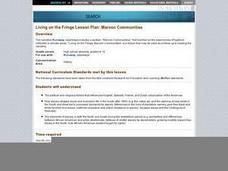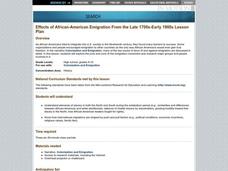Curated OER
Maroon Communities
High schoolers examine political and religious factors that influenced English, Spanish, French, and Dutch colonization of the Americas, how slavery shaped social and economic life in the South after 1800, and elements of slavery during...
Curated OER
The Colonization of Liberia
Students analyze how slavery shaped social and economic life in the South. They study methods of passive and active resistance to slavery, and the similarities and differences between African-American and white abolitionists.
Curated OER
The Literature of Upheaval
In groups, 8th graders read different documents and answer questions on the Civil War period. Students read documents by Thoreau, Stowe and Frederick Douglas.
PBS
Women's History: Parading Through History
Want to teach your pupils about debate, effective speech techniques, propaganda, and the women's movement? The first in a sequential series of three, scholars analyze real propaganda images from the the historic women's movement, view a...
Civil War
Civil War Medicine: Fact or Fiction
Young historians compare the presentation of medical care during the Civil War in passages from fictional and nonfictional texts. They examine passages from Gone with the Wind by Margaret Mitchell and Soldier's Heart by Gary Paulsen, and...
Curated OER
Retain or Abandon, Adapt or Convert? The Immigrant's Dilemma
Young scholars read and discuss a narrative exploring how immigrants retain their own cultures or assimilate into the host country. They examine the emigrant's experience in Liberia and write a position paper.
Curated OER
Women: Struggle and Triumph
Students perform research using primary resources in order to create a knowledge base for the place of women in society. The sources are synthesized by students to reveal the true story of the extraordinary women of America.
Curated OER
The Cotton Gin
High schoolers are introduced to an early American inventor, Eli Whitney, and his experiences with the Patent Office. The economic importance of the cotton gin and its impact on slavery are also addressed.
Curated OER
Centers of the Storm: The Lyceum and the Circle at the University of Mississippi
Greek Revival architecture and the Civil Rights Movement? Sure! Examine how the Lyceum and Circle, two historic buildings located on the campus of the University of Mississippi, relate to integration and the 1962 riot on the university...
Curated OER
Effects of African-American Emigration From the Late 1700s-Early 1900s
Students explore the pros and cons of the emigration movement and research major groups and people involved in it. They view a multi-media narrative imbedded in this plan, then compose an essay stating their point of view.
Curated OER
Whose God?
Students investigate religious freedom in the U.S. They watch and discuss a Bill Moyers NOW video, take a Freedom of Religion quiz, write an essay, and participate in a mock trial and debate.
Curated OER
Sectionalism, Popular Sovereignty and Secession
Students read and discuss background material on several key decisions that played a role in the Civil War including the Missouri Compromise, the Kansas-Nebraska Act and the Dredd Scott Decision. They create a timeline and write an essay.
Curated OER
Irish-Americans: Work and Song
Students research the experience of Irish immigrants who helped build the railroad systems of the United States. They analyze primary source documents, take notes, and create an artistic piece.
Curated OER
When Rice Was King
Students examine the origins of rice production in the South. They identify the steps involved in rice cultivation, examine photos of plantation life, conduct interviews, and research the economic base of their own community.















